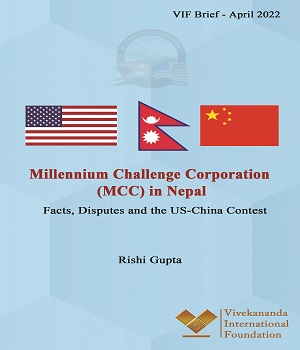
In the past two months, Nepal’s political space had been marred by upheavals and doubts over the future of the ruling alliance between the Nepali Congress, Communist Party of Nepal (Maoist Center)/Maoist Party, and Communist Party of Nepal (Unified Socialist) [CPN-US], over ratification of the Millennium Challenge Corporation (MCC) which is USD 500 million grant offered by the United States (US) to Nepal for a period of five years. The MCC agreement had been awaiting its ratification by the Parliament of Nepal since 2017. Finally, it was ratified on February 27, 2022. However, before it was put through the parliamentary ratification, MCC had become a boiling matter due to several issues raised by the local people, political parties, and the stakeholders in the government. Besides local protests against MCC, Nepal’s northern neighbour China had/has vehemently objected to MCC in Nepal, and tagged it as “looting in the name of democracy (by the US)” and a “geopolitical pact targeting China.” Other than the State Media, the Chinese Ministry of Foreign Affairs (CMOFA), in its several media briefings, has termed MCC as “coercive diplomacy”. Against these observations on MCC by China, the Government of Nepal (GoN) finds the MCC beneficial for the development of Nepal. The successive governments had failed to manage a political consensus among opposition and allies in ratifying the MCC, and the present ruling Nepali Congress Party led by Sher Bahadur Deuba has finally succeeded. To ensure that the MCC is ratified, the government has accommodated the concerns of all parties and stakeholders. Against this backdrop, the present brief explains the MCC and the controversies around it in detail. The brief also provides a detailed analysis of Chinese objections, unease, and geopolitical dynamics due to MCC project in Nepal.






Post new comment